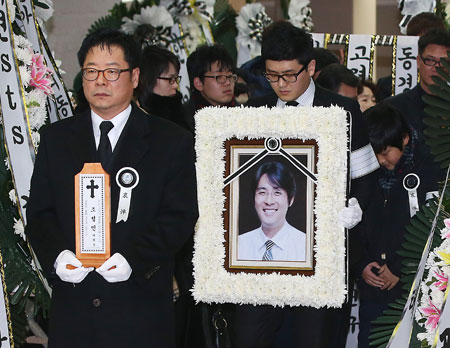
Proper counseling, treatment required to tackle problem
Over 70 percent of people with mental disorders have thought about killing or attempted to kill themselves, according to a report, Tuesday.
With some 3.68 million people in Korea having experienced mental problems at least once in their lifetime, the country needs to help them receive proper counseling and treatment, which will eventually help lower the high suicide rate.
According to the report by the Ministry of Health and Welfare last year, at least one mental disorder was detected among 57 percent of people who thought about committing suicide, 73.7 percent of people who made plans to kill themselves, and 75.3 percent of those who actually attempted to do so.
The report was based on a 2011 survey of 6,000 adults.
While the correlation between suicide and mental problems is high, another alarming result from the survey is the 3.68 million number of people presumed to have had a mental disorder.
Experts say the large number may be one of reasons that Korea has a high suicide rate: According to 2010 statistics, 33.5 people out of every 100,000 people took their own lives, 2.6 times 12.8, the average of OECD member states. Korea has also topped the rankings for eight straight years.
Many celebrities’ suicides are also reported, with the latest one involving former star pitcher Cho Sung-min, the ex-husband of the late actress Choi Jin-sil who also committed suicide in 2008, as did her brother and actor Choi Jin-young in 2010. It was reported the two Chois suffered from depression.
However, very few people seek medical solutions for their mental problems. Another survey conducted on 1,000 adults last year showed that 82.8 percent of them said they suffer from stress but only 5.9 percent have had counseling or medical treatment for it.
“Those people know they have stress. But they don’t know how serious their condition is, and do not actively seek solutions via counseling or other medical services,” said Jang Jin-wook, a researcher at the Korea Institute for Health and Social Affairs.
“In the past, families and the community helped relieve a person’s mental troubles. However, as the family function has weakened, state-level measures for people’s mental health are urgently needed,” he said.
As part of such suicide prevention measures, Busan local government said it will adopt the “psychological autopsy” system, which tracks the last minutes of a person who has committed suicide.
In this system, police interview bereaved family members, friends and co-workers and look into other records including those about diseases, academic performance and income. By doing so, the autopsy is aimed at finding out what psychological factors drove the person to kill themselves and eventually mapping out suicide patterns and helping decrease the current level.
The system was adopted here in 2009, but has not been actively used because bereaved families often refuse to be interviewed. <The Korea Times/Kim Rahn>




